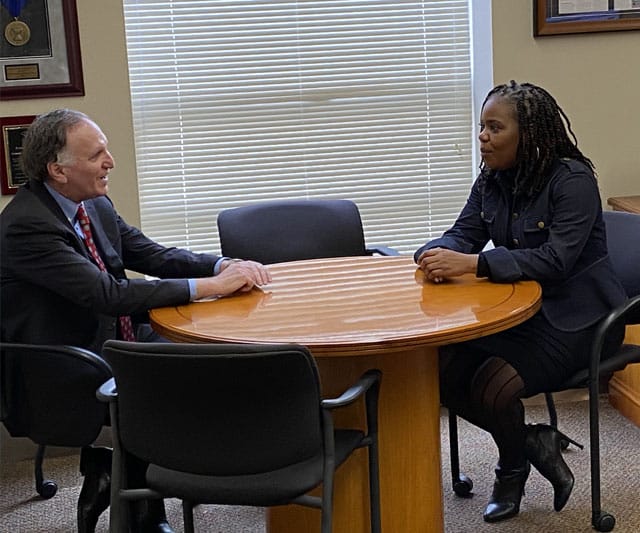In Peter A. Lichtenberg’s world of advising seniors how to avoid being duped and robbed, the horror stories abound.
“Just the other week, I tested a woman whom I’ve tested before but now, her son was threatening to petition for a conservatorship of her estate. He claimed she was having (financial) management problems but I went through her checking account and her statements, and she does not have a cognitive problem.”
“She is just an older woman, trying to combat ageism. We were able to document her cognitive strengths and there was a lack of any cognitive disorder or inability to manage her finances,’’ Lichtenberg says.
A clinical psychologist and PhD, Lichtenberg, 64, is director of the Institute of Gerontology at Wayne State University and founding director of the Wayne State University Lifespan Alliance.
For the past 20 years, Lichtenberg has focused on what he calls his passion — the financial decision making, financial exploitation and financial capacity in older adults. The goal of the university-sponsored online program is to explore issues such as neurocognitive impairment and late life depression, and their impact on quality of life and longevity. The program is free to all, including financial advisors and their clients.
A Common Thread
About 60% of exploited older adults know their exploiter, often closely, says Lichtenberg. Identity theft and scams are costing these older adults billions of dollars each year.
Lichtenberg recalls an elderly male client who became so ill his son believed he would die. But the client recovered and upon returning to his home, found the son had sold everything including the client’s car. The son petitioned a court for control of his father’s finances.
“We are seeing a broader sense of entitlement by adult children to their parents’ money, which is kind of horrifying. There are numerous cases of adult children who, just for whatever reason, want more money.,” says Lichtenberg. “In this case, it was resolved when the judge threw out the son’s petition.’’
Identifying Those at Risk
To help protect older adults from this exploitation, Lichtenberg and his Wayne State University team created the Older Adult Nest Egg project, an interview, rating and self-report assessment review of financial decisions made by older adults.
It provides training, tools and resources for professionals, caregivers and older adults themselves.
“These results help identify those at-risk. And they can protect older adults from financial exploitation like undue influence, financial mismanagement and fraud,’’ he said.
Lichtenberg and his Wayne State University team created an online survey that can be taken anonymously. It was created out of focus groups with older adults and sessions with advisory groups of financial advisors, accountants, bankers and other financial professionals.
Over the past three years, more than 2,000 individuals have taken the anonymous online Financial Vulnerability Survey from the Older Adult Nest Egg project. The survey may be accessed by a friend, family member or financial professional if the respondent wishes to have the survey evaluated by another party.
Financial advisors can discuss the survey results with their clients. The Older Adult Nest Egg also has a partnership with Janus Henderson, which presents information about the project to its advisors nationally.
Multiple Cries for Support
“People are touchy about money in general, and older adults feel especially anxious,” says Lichtenberg.
Among older adults he surveyed, 65% said they’re anxious about making financial decisions and more than 50% said they wish they had someone to discuss finances with. Yet 30% said they’re worried someone will take away their money. His research was part of the 2018 University of Michigan Health and Retirement Survey, a longitudinal survey of Americans over age 50.
“Risk tolerance is important, but it’s also important for financial advisors to get a sense of how financially vulnerable a client is, especially to being exploited.,” said Lichtenberg. “The [Older Adult Nest Egg’s Financial Vulnerability] survey is a nice way for the financial advisor to get a sense of the financial life of the client.”
In creating the survey, Lichtenberg and his team first queried older adults, then worked with financial professional advisory groups.
“The questions came out empirically, comparing those who had been exploited and those who had not,’’ he said.
Ongoing Efforts
Lichtenberg and his team also conduct telephone, in-person or Zoom meetings with respondents, with about 90% of the interviews done over the phone, he says. Most of the respondents live in Michigan, where Wayne State University is located, or in neighboring Ohio.
The program assesses each respondent’s financial vulnerability based on the interview and the survey results. The Older Adult Nest Egg’s online scale of financial vulnerability determines the respondent’s level of financial strain; financial literacy, psychological vulnerability around finances and susceptibility to exploitation.
Respondents can then receive coaching for free from the project’s SAFE program (Successful Aging Thru Financial Empowerment). SAFE was established in 2017 by Lichtenberg and LaToya Hall, a social worker affiliated with Wayne State University.
The SAFE financial coaching and education program offers help in 10 areas, such as reporting scams and identity theft to the proper channels; submitting fraud complaints to close fraudulent accounts, and removing negative items from credit reports that have been breached by identity theft.
So far, 141 people have gone through the SAFE coaching and another 80 have received information and referral services, says Lichtenberg.
Under the Hood
Lichtenberg further explains how the assessments work. “Part of the reason we created our scale of financial decision-making was to look at decisions that the older person has made as well as their susceptibility to exploitation,” he says. “It is not uncommon to find people don’t understand how decision-making will impact them financially, what the risks are, and who benefits most from the decision. We get at that very concretely.”
Information is gathered on how well the respondent communicates choices in financial matters and how well they understand the risks and benefits of those choices.
That data is combined with information from a neuro-cognitive evaluation that assesses potential problems in the older brain: memory, executive function deficits and impairments in spatial problem solving.
“We also assess how aware respondents are of their own deficits: Do they have any awareness and can they compensate? If you are not aware, you don’t know to have to compensate. They don’t think anything’s wrong,’’ Lichtenberg said.
The Aging Brain
Does the older brain change? Lichtenberg says that is the question of the day.
“Everybody is looking for one answer about aging! There are a lot of individual differences and when the brain deteriorates, there are many ways of measuring it. We can see brain changes, such as Alzheimer’s disease, based on imaging, and we can see through an MRI very small ischemic stroke activity,” he says.
“Then we can pair those up with actual cognitive changes when they begin to impair a person’s ability to make financial decisions.”
“One thing we also know is that people start to change cognitively very early on. How early? That is a tricky one to answer. There are speed-of-processing changes early on, even in the 20s, but you really don’t see, in normal cognition, reliable memory changes until about the 70s and 80s,’’ Lichtenberg said.
More information is available from p.lichtenberg@wayne.edu, or by calling (313)664-2633.







